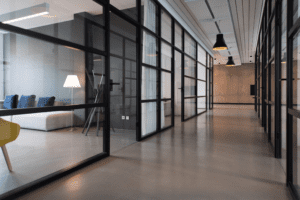 Summertime in Santa Rosa can get hot. Having a reliable air conditioning setup for your business can mean more productive workers, happier customers, and improved workplace morale. Installing commercial cooling systems is an investment, but it’s an undeniably smart one for businesses that want to maintain their traffic and efficiency during the summer. The question is, if your business needs a cooling system—whether as a first-time installation or to replace a failed older unit—where do you start? This post will outline some of the considerations to keep in mind as you shop around for—and eventually install—your new commercial air conditioning system.
Summertime in Santa Rosa can get hot. Having a reliable air conditioning setup for your business can mean more productive workers, happier customers, and improved workplace morale. Installing commercial cooling systems is an investment, but it’s an undeniably smart one for businesses that want to maintain their traffic and efficiency during the summer. The question is, if your business needs a cooling system—whether as a first-time installation or to replace a failed older unit—where do you start? This post will outline some of the considerations to keep in mind as you shop around for—and eventually install—your new commercial air conditioning system.
- Know when to install a new system: Cooling systems don’t last forever. Eventually, your commercial HVAC system will start losing efficiency, making odd noises, inconsistently cooling your business, or otherwise showing signs of age. To know for sure that your system is due for an upgrade, call an HVAC technician for an inspection. Maintenance and repair work can add years of life to commercial cooling systems, but at some point, opting for a newer, more powerful, and more efficient system will be the preferable option. Your HVAC expert will be able to give you a recommendation on the matter.
- Consider system size: One of the most important things to get right when purchasing a new commercial air conditioning setup is size/capacity. If you get a system that is too small, it will struggle to cool your space effectively. If you get a system that is too big, it will turn on and off so many times—and in such short bursts—that it will waste energy without satisfactorily cooling and dehumidifying your property. You need to hit system size just right for your cooling system to work the right way. Again, trust in your HVAC expert to calculate the load demands of your space and tell you how much power you need in your system.
- The state of the ductwork: If you’re replacing an existing commercial cooling system with a new unit, there will likely already be ductwork installed on your premises. However, just because there is ductwork doesn’t mean that it’s in good shape. The ductwork could be old and inefficient, poorly insulated, damaged, or dirty. Have your HVAC technician check the ducts thoroughly; clean them of dust, mold, and other contaminants; repair any damage; and make sure they are properly sealed and insulated. Ducts that are old or have fallen into disrepair can leak vast quantities of cool air before it reaches its environment—costing you hundreds or thousands of dollars a year on wasted energy expenditures.
- Energy efficiency: So many HVAC systems manufactured today have been built with new energy efficiency standards in mind. Looking for EnergyStar-rated equipment will give you a greener, more sustainable cooling system that uses less energy and costs less money to run throughout the warm months.
- Zone control needs: Smaller businesses won’t necessarily need zone control for their cooling systems. For instance, a retail store that is essentially a single large room won’t need to worry about cooling different zones differently. In larger buildings, though—such as multi-floor office buildings—it makes sense to have a zoned setup. The same statement holds true in situations where parts of the building are going to be used less than others, or where specific rooms or sections of the building (such as kitchens or manufacturing areas) are going to be producing a lot more heat than others. Talk to your HVAC technician about how to design and execute a zone control plan for your cooling setup.
- Other temperature factors: When investing in a brand-new cooling system for your commercial building, it makes sense to spare a thought or two for other factors that might impact the interior temperature. Examples include windows, blinds, and the overall orientation of your building toward the rising or setting sun. Old, inefficient windows can leak cool air, rendering your air conditioning system less efficient. Offices or rooms that are always getting blasted by sunlight, meanwhile, are going to be warmer than other parts of the building. You might consider upgrading your windows or investing in automated blinds to help maximize the efficiency of your air conditioning setup.
Find Out About the Costs of Commercial Cooling Systems: Ask for a Quote from Your HVAC Company
Finally, think about cost. While upfront expenditure should not necessarily be your top consideration when upgrading your business’s cooling system, it will undoubtedly be a point of interest. You should focus on getting an appropriately sized system, with a reasonably good energy efficiency rating, that will meet the needs of your building. Still, asking your HVAC contractor for a quote before agreeing to any commercial cooling systems is a must. Any reputable HVAC company should be willing to provide a detailed, honest quote free of charge.

